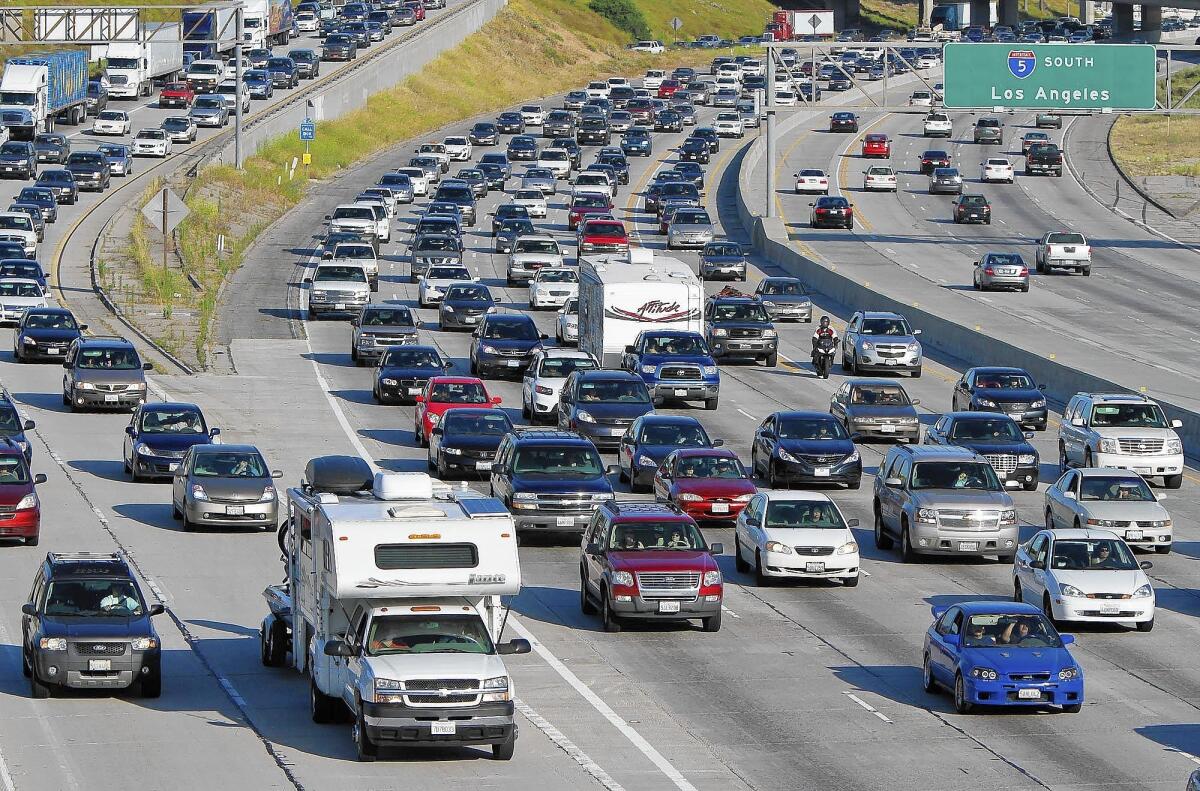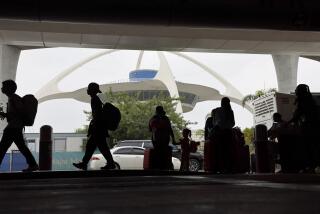Memorial Day traffic expected to spike

Southern Californians who plan to travel Memorial Day weekend can expect the good, the bad and the ugly.
The “good” will be warm, sunny weather. The “bad” will be gasoline prices slightly higher than the same time last year. The “ugly” will be a surge in freeway gridlock that can increase the time it will take to get out of town up to 90%.
An estimated 2.66 million Southern Californians will travel for the holiday, the highest number since the record of 3.2 million in 2005, according to a forecast by the Auto Club of Southern California.
The number of vacationers traveling at least 50 miles is expected to jump 1.8% compared with last year, slightly higher than the 1.5% increase that the Auto Club forecast for the nation.
But some Southern Californians have had enough experience with gridlock to avoid the freeways on holidays.
Arthur Fleisher, a retired physician from Northridge, said he and his wife are inviting friends over for a gathering instead of driving for the holiday.
“We both realize that traffic is only going to get worse,” he said. “And unfortunately, L.A. was built horizontally rather than vertically.”
Some Southern Californians who are planning road trips are making adjustments to avoid gridlock.
Victor Franco Jr., a lobbyist from Woodland Hills, is taking his family on a quick trip to Pismo Beach. He plans to leave early Friday to avoid the congestion on major freeway interchanges, and to return late Sunday to avoid the Monday crush.
On his daily commute from the San Fernando Valley to downtown Los Angeles, Franco said, he has invented some unusual shortcuts to avoid traffic.
“I’m like Inspector Gadget when it comes to alternative routes,” he said.
The Auto Club attributes the traffic jump to a rebounding economy, improved job growth and a brighter outlook by workers about their financial future.
“When people are feeling OK about their personal economic situation, it does impact their vacation plans,” said Auto Club spokeswoman Marie Montgomery.
Gasoline prices are expected to be about 10 cents higher than last year, not enough to discourage most vacationers, Montgomery said. The average cost of a gallon of regular, self-serve gasoline in the Los Angeles area is $4.18, compared with $4.09 last year, according to the Auto Club.
But the dark side to a rebounding economy is freeway gridlock, said Jim Bak, a traffic analyst for INRIX, a Washington-based traffic data analysis company.
A strong economy means more companies transporting goods via trucks and trains, more workers commuting to jobs and more people spending money on vacations. The result will be a 25% increase in traffic nationwide this Memorial Day weekend compared with last year, Bak estimated.
“When people are working, they have money to spend,” he said. “They go to a movie, go to dinner and take a long weekend trip. Also, if people are spending, companies are shipping products.”
In other parts of the country, particularly on the East Coast, traffic may also surge this weekend because vacationers are ready to travel after a winter of severe storms that closed airports and frustrated drivers.
“Lots of people have been cooped up all winter and want to get out,” he said.
For Southern California drivers, Bak’s data shows that the typical “rush-hour” traffic should begin at about 2 p.m. Friday, when vacationers start to head out early for their weekend destination. The returning traffic will be spread out from Sunday through Monday, but drivers may still run into pockets of congestion throughout the weekend, he said.
According to a survey by Auto Club travel agents, San Diego, Las Vegas and San Francisco will be the most popular destinations for Southern Californians.
Based on data from freeway sensors and historic traffic trends, Bak predicts that traffic will delay drivers trying to get from Los Angeles to San Diego more than 90%, and the driving time to Las Vegas will increase about 20%.
More to Read
Inside the business of entertainment
The Wide Shot brings you news, analysis and insights on everything from streaming wars to production — and what it all means for the future.
You may occasionally receive promotional content from the Los Angeles Times.










